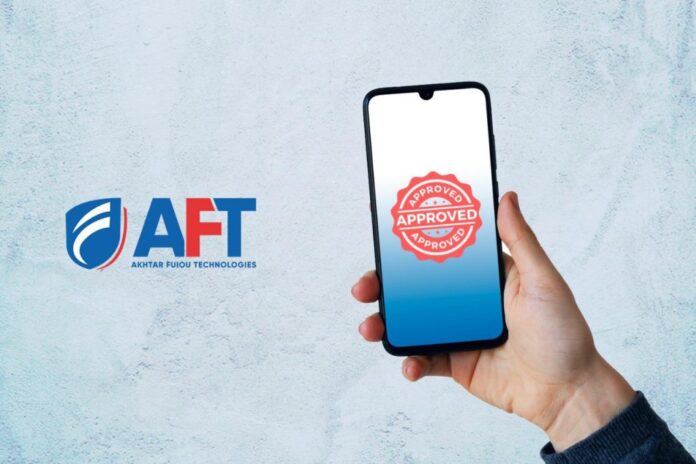Akhtar Fuiou Technologies, an up-and-coming financial technology (Fintech) company, has received State Bank of Pakistan’s (SBP) in-principle approval for Electronic Money Institution (EMI) license, making it the third fintech company to receive the in-principle approval from the country’s top financial services regulator.
With the newly secured approval, the company has its eyes set on digitising the way financial transactions are carried out in Pakistan with the launch of an e-wallet to digitise payroll processing in industries, facilitating remittances through the wallet and provisioning of Point of Sale (PoS) terminals for processing digital payments.
“The in-principle EMI approval for e-wallets provided by SBP will allow AFT to connect with and extend its services to Pakistan’s large unbanked population,” a statement from the company read. “AFT will effectively contribute to further the digital payments ecosystem in Pakistan and in doing so, it will bank on its extensive international reach with ready access to state-of-the-art global technology,” it added.
Akhtar Fuiou Technologies
Akhtar Fuiou Technologies is the culmination of a partnership between Pakistan’s Akhtar Group and the Chinese Fuiou Pay to further digitise Pakistan’s rapidly growing financial payments infrastructure through leveraging Akhtar Group’s industrial presence and expertise and Fuiou Pay’s technological finesse. Another party to this joint venture is Chinese eCommerce platform JollyChic that has come in as an investor in the company, with plans of launching the eCommerce platform in Pakistan in the future.
Incorporated late last year, Akhtar Fuiou Technologies is the new venture into the technology world of an old business group in Pakistan. The Akhtar Group owns sugar mills, ethanol distilleries, and a CO2 plant. Besides the sugar business, the Group has a presence in steel and textile industries and is the franchisee for PepsiCo in Lahore through Lotte Akhtar Beverages – a joint venture between Korean Lotte Corporation and the Akhtar Group.
On the other hand, China’s Shanghai Fuiou Payment Services Limited (also called Fuiou Pay) was established as a financial technology company by employees of a major Chinese financial services company, China Union Pay (CUP) that provides bank card services and is a globally recognised card scheme that competes with the likes of Visa and Mastercard. In China, Fuiou Pay is a major player in processing inward digital remittances, e-wallets and provisioning of payments hardware and software like Point of Sale terminals.
“Our aim is to bring top-notch technology from China to Pakistan and we will rely on our local partner, Akhtar Group, to set up the network and the connections and to better serve the Pakistani merchants and institutions and individuals,” says Mick Wu, the CEO of Akhtar Fuiou Technologies.
With the three companies together, AFT is set about with an initial investment of roughly $5 million and zealous plans for Pakistan’s payments industry.
E-wallet and digitisation of industries
In the world of EMIs in Pakistan, there are eight known fintech companies that are gunning to digitise payments through e-wallets. The prominent ones are Finja, SadaPay and Nayapay that have all launched their pilots, whereas EP Systems, TAG, and now AFT have only received in-principle approval, which will be followed by the pilot phase and then the commercial launch of the wallet. AFT will be commencing its pilot within a period of six months.
“AFT’s first focus is to offer e-wallets for domestic industries to digitise their operations,” read a statement from the company. The company asserts that its entry into Pakistan’s new economy is in line with its ethos to work towards the diminution of financial exclusion in the country.
In keeping with this vision, Akhtar Fuiou Technologies would be starting off with payroll processing for sugar mills. Qasim Akhtar Khan, strategy executive at AFT, says that the aim is to target Pakistan’s unbanked rural population.
“Starting off with cloud-based payroll solutions would enable AFT to rapidly provide mobile wallets to the primarily unbanked employees of agricultural commodity-based industries located in Pakistan’s rural areas,” he says. “The idea is to digitize, document, and streamline raw material procurement, which makes up the bulk of the cost of production in these industries,” says Qasim.
“We are going for the payroll wallet because we have a large base of workers working in different factories and industries and payroll is the source of income. First of all, we are going to digitalise that part and add relevant services and features and value-added services to them,” says AFT CEO.
For the wallet, AFT is going to harness the ability of Fuiou Pay that has a technology team sitting in China. Fuiou Pay is a technology group of over 250,000 people that provides technology solutions to individual merchants like little grocery shops on the street, to financial institutions, and domestic big banks like HSBC. Though the technology is going to be modified for the Pakistani market, it is going to be built on cutting-edge and innovative foundations that Fuiou Pay has worked to build over the years in China.
On the other hand, “AG’s strong presence in the agricultural commodities, industrial chemicals, and FMCG sectors will help AFT establish multiple use cases for its mobile wallets across a wide range of industries,” says Qasim.
“The vast distribution network AG has established in its FMCG business will enable AFT to create merchant wallets for distributors and retailers and eventually result in a large agent network which will assist the company scale both in the PoS terminal acquiring business and in creating an unparalleled last-mile infrastructure for inward cross border remittances,” adds Qasim.
This is the essence of this partnership: Fuiou Pay will be providing the technology to make the e-wallets; it already operates some wallets in China, and has partnered with major internet companies like Amazon, Payoneer, and Airbnb. In concert, the Akhtar Group is going to leverage its industrial presence for the initial launch of the wallets for payroll processing in the sugar industry and the planned digitisation of other sectors.
This here is also the differentiating factor between AFT and other fintech companies: AFT is moving to digitise industries that it knows and has influence in; it has the technology that it has earlier used to help digitise the world’s second-largest economy; and all that is coupled with the financial heft that the partnership brings.
Scaling wallet for remittances
Besides payroll processing, AFT will also work towards creating an ecosystem for inward and outward remittances, in line with the State Bank of Pakistan’s vision to bring Pakistan’s diaspora into the country’s home banking system.
“Leveraging AG’s footprint and clout across various industries, AFT aims to create a large base of merchants and consumers in Pakistan using its mobile wallets, enabling AFT to reach out to the exchange companies, fintech’s, banks, financial card operators, and other alternative remittance systems to facilitate home remittances from overseas Pakistanis who are sending money back to AFT wallet users in Pakistan,” says Qasim, contextualising the case for remittances on AFT wallets.
Quite simply, remittances would be received into the AFT consumer wallets that would be available to be withdrawn as cash using the China Union Pay branded AFT debit cards. Fuiou Pay has similar arrangements for wallet users in the Middle East and AFT also plans to start off with remittances from the Middle East.
And if cash withdrawals are not enough, wallet users will also be able to make various payments like school fees and utility bills, and QR payments through the remittances received into the wallet
“On the remittance business we fully understand and we have witnessed a lot of news that inward remittance of Pakistan has risen significantly. In China, we have a cross-border payment license and we are really familiar with cross-border payment because that is what we are doing in China. We have technologies and market knowledge to do that,” says Mick.
“With many other value-added services, we can achieve use cases and a customer base to further broaden our technology and services,” he adds.
But AFTs push towards digitising remittances comes at a time when the State bank of Pakistan (SBP) is pushing the adoption of Roshan Digital Account (RDA) which does what the AFT wallet is going to do, and more, and remittances received through RDAs have pushed the $2 billion mark mainly on the back of aggressive marketing by the government itself.
Does this make things difficult for AFT when it has the central bank and the government as its nemeses? Qasim, while acknowledging the contribution of RDAs towards the improvement of remittances, dismisses it as a concern because the remittances received through RDAs are still a very small percentage and the actual potential is much higher.
“Foreign Remittances play a crucial role in maintaining Pakistan’s balance of payments and are the single largest source of foreign exchange, ahead of exports and foreign investment,” says Qasim.
“In the past year, remittances have grown by a whopping 30% and are expected to reach $30 billion for this fiscal year while experts believe that an additional $10 billion flowed into the country via illegal channels over the past year so AFT feels that while the SBPs RDA scheme and other private sector players are entering this space, it is still big enough and will continue to grow because the proportion of OPs sending remittances through legal corridors will increase due to FATFs scrutiny of Pakistan and the global push towards transparency in the form of AML/CFT regulations,” he adds
PoS and QR codes for payments
Besides launching e-wallets, AFT plans to build on the financial technology hardware expertise of Fuiou Pay in China to provide PoS terminals in Pakistan. To be clear, AFT is not going to be another acquirer for Point of Sale machines. It is going to be a distributor of PoS terminals for acquiring banks in Pakistan, through an exclusive distribution agreement from a major Chinese payments hardware provider.
Mick explains that in Pakistan, AFT plans to introduce smart PoS machines that have the functionality of processing bank card transactions as well as QR transactions, on the same machine. “With smart machines, you would be able to process bank cards initially. In the future, when QR payments start to spread in Pakistan, the machine will be capable of reading those QR codes. It would be like banks and merchants would not have to spend extra money to carry out QR code transactions,” says the CEO.
“In Pakistan, there are currently just 50,000 PoS Terminals but SBP aims to increase that number ten times to 500,000 over the next three years. Bearing in mind Fuiou’s relationships with the leading PoS manufacturers in China and with UnionPay which Is the world’s largest financial card operator, AFT is uniquely positioned to capitalize on this lucrative opportunity to digitize Pakistan’s payment ecosystem by providing smart PoS Terminals and issuing UnionPay Debit Cards to its wallet users,” says Qasim.
Payments via QR codes have seen an abysmally low uptake in Pakistan and AFT recognises the hurdle. While the Pakistani population has thus far remained averse to smart payment technologies, AFT’s bet is that the era of QR codes will be more bullish than all other forms of payments in Pakistan, and once recognised, the Pakistani population will overlook debit cards to move directly to QR codes from cash.
“The annual transaction volume handled by Fuiou in China is $200 Billion, which is approximately 2/3rd the size of Pakistan’s GDP. 90% of those transactions are QR code-based, and considering that only 12% of Pakistan’s population has access to payment cards, AFT can foresee that like China, Pakistan will transition straight from a cash-based economy to one where QR codes will become the predominant payment mechanism, bypassing the financial cards,” says Qasim.
























